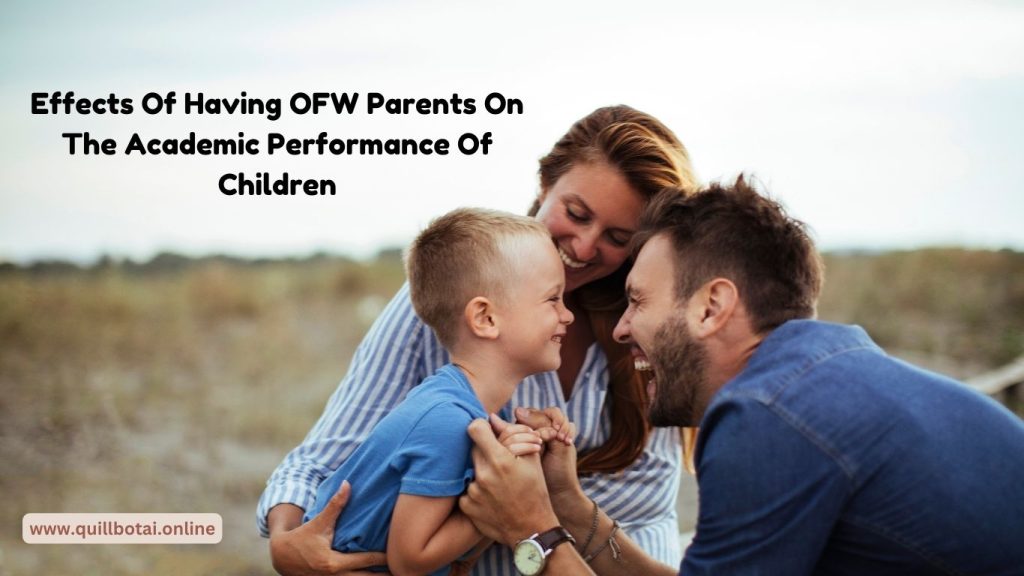
Introduction
In today’s globalized world, the phenomenon of Overseas Filipino Workers (OFWs) has become increasingly common. Many parents from the Philippines seek employment abroad to provide better opportunities for their families. However, this decision often comes with various effects on their children, particularly regarding their academic performance. In this article, we will explore the impacts of having OFW parents on the academic performance of children, drawing insights from various studies and experiences.
Common Effects on Children with OFW Parents
Children whose parents work abroad can experience a range of emotions and challenges. They may feel a sense of loneliness or abandonment, as they miss the physical presence of their parents. This emotional strain can affect their concentration and motivation in school. Additionally, they might face pressure to excel academically to make their parents’ sacrifices worthwhile, leading to stress and anxiety.
Effects on Family Relations
The absence of one or both parents can also impact family dynamics. Children may become more independent but also feel a lack of guidance and support. Communication with parents might be limited due to time differences and work schedules, leading to misunderstandings or a sense of disconnect. The role of caregiving often shifts to other family members, such as grandparents or older siblings, which can change the family structure and responsibilities.
Parental Involvement in Academic Performance
Studies have shown that parental involvement is crucial for a child’s academic success. However, for children with OFW parents, this involvement is often indirect. Parents may provide financial support for education but cannot participate in school activities or help with homework. This lack of direct involvement can lead to a gap in the child‘s educational experience, making it challenging to keep up with their peers.
Negative Experiences Faced by OFWs
The experiences of OFWs themselves can indirectly affect their children’s academic performance. Many OFWs face challenges such as workplace abuse, homesickness, and cultural adaptation. These negative experiences can impact their mental health and, in turn, their ability to provide emotional support to their children. The stress and worries of parents working abroad can be felt by their children, affecting their focus and performance in school.
Academic Performance of Students with OFW Parents
Research has shown mixed results regarding the academic performance of students with OFW parents. Some studies indicate that these students perform well academically due to the financial stability provided by their parents’ remittances. However, other studies suggest that the lack of parental guidance and emotional support can lead to lower academic achievement. It’s essential to consider the individual circumstances and support systems available to each child.
Strategies for Supporting Children with OFW Parents
To mitigate the negative effects on academic performance, several strategies can be implemented:
- Regular Communication: Encourage frequent and open communication between parents and children through video calls, messaging, and letters.
- Emotional Support: Provide a strong support system at home, with caregivers who can offer guidance and emotional support.
- Involvement in School Activities: Even from afar, parents can stay involved in their children’s education by communicating with teachers and being informed about their progress.
- Counseling Services: Schools can offer counseling services to help children cope with the emotional challenges of having OFW parents.
- Community Support: Community organizations can provide programs and activities to support children with OFW parents, fostering a sense of belonging and support.
Conclusion
Having OFW parents can have a significant impact on a child’s academic performance, with both positive and negative effects. It’s crucial to recognize the challenges these children face and provide them with the necessary support and resources to thrive academically and emotionally. By fostering strong communication, emotional support, and involvement in their education, we can help these children reach their full potential despite the distance from their parents.
Remember, every child’s experience is unique, and it’s essential to approach each situation with empathy and understanding. By working together, we can ensure that children with OFW parents receive the support they need to succeed academically and thrive in all aspects of their lives.

Dedicated to guiding you through Research, Thesis, and Vocabulary. Unlock your potential at Free QuillBot AI Learning Hub with me.